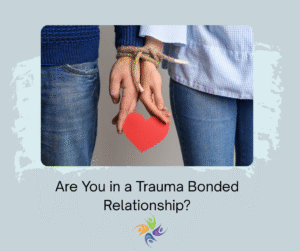 Your friends have had enough. They haven’t outright told you, but you sense it. The thing is, when he doesn’t call when he said he would and your calls go to voicemail, the panic is so intense it feels like the house is on fire. Every fiber of your being is activated and the thought of losing him is too catastrophic to contemplate. Despite being told over and over to ditch the dude, you can’t. For you, he’s life itself.
Your friends have had enough. They haven’t outright told you, but you sense it. The thing is, when he doesn’t call when he said he would and your calls go to voicemail, the panic is so intense it feels like the house is on fire. Every fiber of your being is activated and the thought of losing him is too catastrophic to contemplate. Despite being told over and over to ditch the dude, you can’t. For you, he’s life itself.
Those who don’t understand trauma bonding may think this example is dramatic, even out of control. For those who know, welcome.
What is Trauma Bonding?
In a nutshell, trauma bonding is an intense bond formed in a toxic or otherwise abusive relationship. The person on the receiving end stays for the good times (because when it’s good, it’s the best ever!) But along with those highs come the inevitable lows that often contain mistreatment, neglect, sometimes even abuse.
What Causes Trauma Bonding?
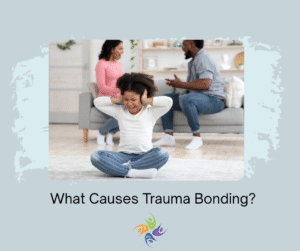 Many people who are trauma bonded in relationships experienced similar situations in childhood, likely with a primary caregiver. This skewed their notion on what love is. It adds a complex deep-rooted “glitch” that, if left unchecked, can leave the person prone to subconsciously seek out trauma bonding. Therefore, they spiral in and out of intensely dysfunctional relationships.
Many people who are trauma bonded in relationships experienced similar situations in childhood, likely with a primary caregiver. This skewed their notion on what love is. It adds a complex deep-rooted “glitch” that, if left unchecked, can leave the person prone to subconsciously seek out trauma bonding. Therefore, they spiral in and out of intensely dysfunctional relationships.
Additionally, multiple studies have proven the addictive power of intermittent reinforcement, which is a key component in trauma bonding. The mistreatment and abuse are often followed up with profoundly heartfelt apologies, admissions of wrongdoing, and it’s good for a bit… until the cycle repeats itself.
Why Do People Stay in Trauma Bonded Relationships?
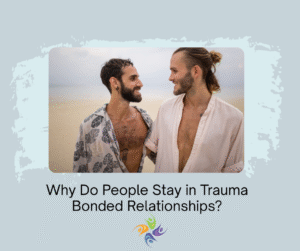
Human beings are complex with multi-dimensional identities and characteristics. Someone in an emotionally manipulative trauma bonded relationship could easily justify the abuse because it’s not physical. And the person they bonded with likely has some great qualities along with the not so favorable ones.
Trauma bonding is incredibly powerful because usually the abuser is charismatic and loving. It’s hard when you feel like the person really “sees” you in the good moments, and makes you feel like the most special person in the world. When it gets bad, you’ll do anything to get back to those good stages again. Because you truly believe no one else will understand you or love you in the same way.
When we’re in the stages of addiction (which trauma bonding is, to a degree) our brains will take all sorts of shortcuts to justify engaging in the behavior. There’s no shortage of logical fallacies committed in the process.
The manipulation associated with trauma bonding can erode the trauma bonded person’s self-esteem. It can lead them to believe that they are worthless and no one else will love or understand them.
What Are Signs of a Trauma Bonded Relationship?
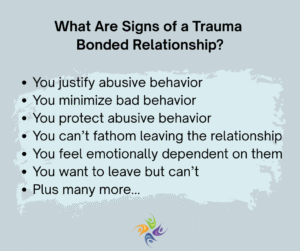
- You justify abusive behavior
- You minimize bad behavior
- You protect abusive behavior
- You can’t fathom leaving the relationship
- You feel emotionally dependent on them
- You want to leave but can’t
- You feel shame and guilt
- You feel like you’ve lost yourself
- You walk on eggshells around them
- They gaslight you
- They shame you
- They criticize you
- They’ve isolated you from friends and family, or try to
- They love bomb you
- They devalue you
There is an intensely addictive component to trauma bonding that makes you feel as though you can’t live without them. Logically, you may see how this is untrue, but emotionally, it actually feels that way.
I’m in a Trauma Bonded Relationship, Now What?
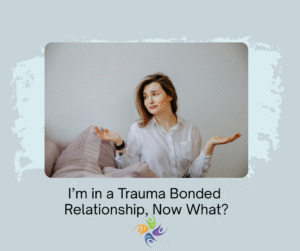
While a therapist will never tell you what to do, they will help you gain clarity, strength, and perspective. In some cases, the person you’re in a relationship with may also agree to seek therapy to address their behavior, however this is not always the case.
Your therapist will help rebuild your self-esteem. They will validate your reality which often gets twisted when you’re in a trauma bonded union. Your therapist will help you establish boundaries and educate you about what is and is not acceptable behavior from a partner. Additionally, they will assist you as you build yourself back up, reinforcing the fact that you deserve to be treated well.
At the Relationship Therapy Center, we have some incredible therapists on our team who would love to help. Give us a call today to learn more about who we are and what we do.
Begin Individual Therapy in the Sacramento Area

If you are ready to start individual therapy, we have a variety of exceptional therapists ready to help you. Take a look at their bios and if you would like to schedule a free 15-minute consultation give us a call.
Other Services Offered at The Relationship Therapy Center in California:
In addition to Individual therapy for adults our Sacramento area counseling clinics located in Roseville and Fair Oaks, CA are pleased to offer a variety of mental health services. Our couples services include: Counseling after infidelity, sex therapy, co-parent counseling, family therapy, divorce counseling, intensive couples retreats, and premarital counseling. Our individual therapy services include, therapy for children, teen therapy, depression treatment, and individual relationship counseling. Our therapists offer online counseling in California to treat a variety of mental health concerns. Please reach out to our Sacramento area therapy office to learn more about the many ways we can help you or your loved ones heal and grow.
- Can a Marriage Counselor Save a Marriage? - February 26, 2026
- Is Our Communication Bad Enough for Therapy? - February 19, 2026
- What are Examples of Trauma? - February 12, 2026
